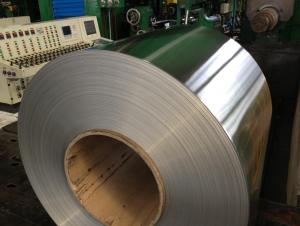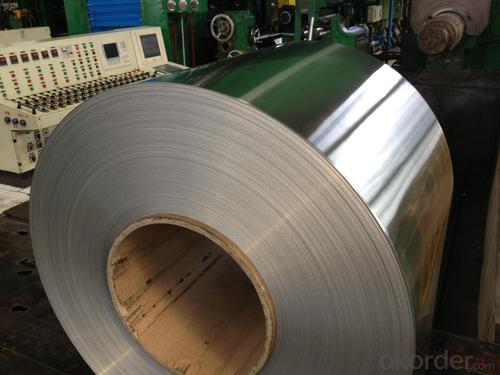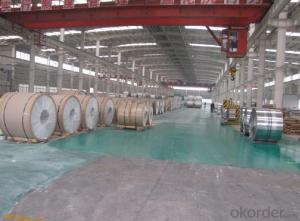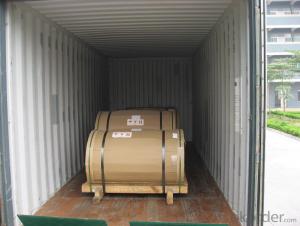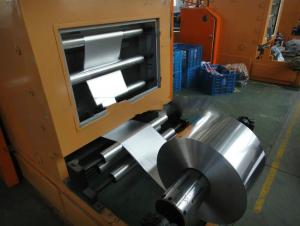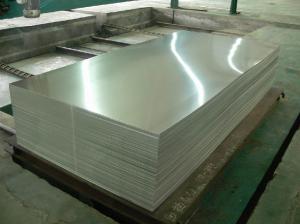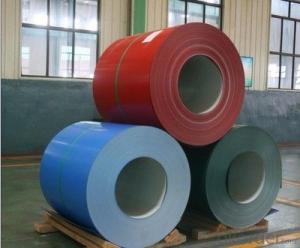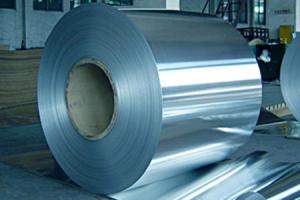Mill Finished Aluminium Sheet and Coils for Rerolling
- Loading Port:
- Shanghai
- Payment Terms:
- TT or LC
- Min Order Qty:
- 5 m.t.
- Supply Capability:
- 50000 m.t./month
OKorder Service Pledge
OKorder Financial Service
You Might Also Like
1.Structure of Mill Finished Aluminium Sheet and Coils for Rerolling
Mill Finished Aluminium Sheet and Coils for Rerolling is one semi-finished aluminium material. This strip can be rolled down to aluminium coil,sheet,circle ect. The alloy AA1050 is widly used in building, industry ect. Its weight is much lower than steel. So many customers choosed aluminium material instead of steel.
2. Main features of the product
a.Competitive price---We have our own mills and can produce mill finished aluminium coils, so we can control the production cost better.
b.Professional after-sale service---We have more than 15 years exportation experience and you need not worry about the exporation problems.
c.Fast delivery time---We can control the delivery time within 35 days.
3. Image
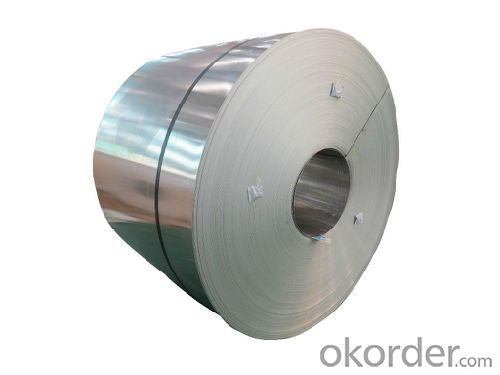
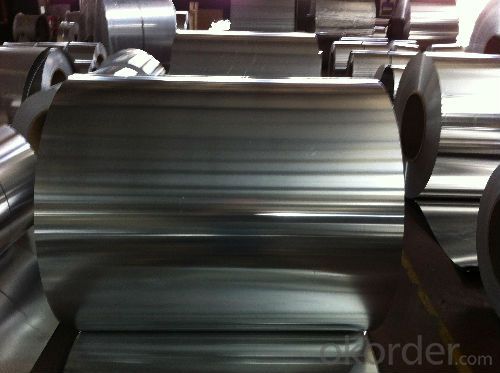
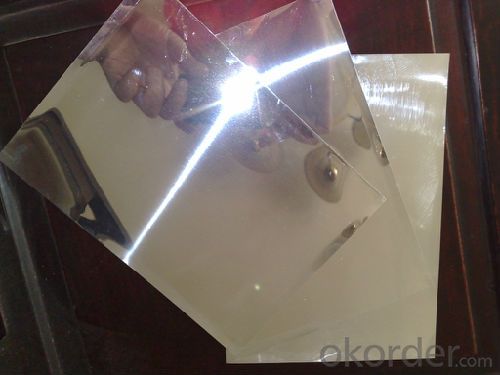
| Alloy | Temper | Thickness | Width | Weight |
| AA1050 | H14 | 0.2MM-3MM | 900MM-1800MM | 2 TON |
5.FAQ:
What is the quality standard?
---Usually our standard is GB3880-2006
What is the largest width?
---It is 2300mm
What is the MOQ?
---Usually we can accept 80 tons.
- Q: How are aluminum coils used in the production of electronic devices?
- The production of electronic devices heavily relies on aluminum coils, which perform a crucial role. When it comes to manufacturing the internal components of electronic devices like transformers, inductors, and electromagnets, aluminum coils are the go-to material. These coils are formed by winding aluminum wire around a core, creating a compact and efficient conductor for electrical currents. Transformers make use of aluminum coils to transfer electrical energy between circuits. By utilizing electromagnetic induction, these coils allow for voltage transformation. When a varying current flows through one coil, it induces a voltage in another coil. This process is essential in adjusting voltage levels, ensuring efficient power distribution in electronic devices and electrical systems. Inductors, another vital component in electronic devices, are constructed using aluminum coils. These coils resist changes in electrical current and store energy in their magnetic field. Aluminum coils possess low resistance, high conductivity, and the ability to handle high-frequency currents, making them perfect for inductor applications. They find their use in various electronic devices like power supplies, speakers, and filters to control current flow and regulate voltage. Furthermore, aluminum coils are utilized in the production of electromagnets, which are widely employed in electronic devices. The creation of electromagnets involves passing an electric current through a coil to generate a magnetic field. Aluminum coils are preferred due to their lightweight nature and excellent thermal conductivity, enabling efficient dissipation of heat in high-power applications. Moreover, the use of aluminum coils in electronic devices brings several advantages such as cost-effectiveness, lightweight construction, and excellent electromagnetic properties. Aluminum's lightweight characteristic allows for the production of compact and portable electronic devices, enhancing convenience for users. Additionally, its high thermal conductivity ensures efficient heat dissipation, which is critical in preventing overheating and maintaining proper functionality of electronic devices. In conclusion, aluminum coils find extensive usage in the production of electronic devices, serving various applications like transformers, inductors, and electromagnets. Their exceptional electrical conductivity, lightweight construction, and thermal conductivity make them an ideal choice for achieving efficient and reliable performance in electronic devices.
- Q: Is it safe for individuals to handle aluminum coils?
- <p>Aluminum coils are generally safe to handle under normal conditions. They do not emit harmful radiation or toxic fumes. However, it's important to take precautions to avoid injury from sharp edges or heavy weight. Always use appropriate lifting equipment or assistance when handling heavy coils. Additionally, wear protective gloves to prevent cuts and ensure good housekeeping to avoid tripping hazards. In case of skin contact with certain aluminum processing fluids, it's advisable to wash the affected area immediately with soap and water.</p>
- Q: How are aluminum coils tested for quality assurance?
- Aluminum coils are tested for quality assurance through various methods and parameters to ensure their compliance with industry standards and customer requirements. One of the most common tests performed on aluminum coils is the dimensional inspection, where the dimensions and tolerances of the coils are measured and compared with the specifications. This ensures that the coils are manufactured within the required size and shape. Another important aspect of quality assurance testing is the evaluation of the mechanical properties of the aluminum coils. This includes tests such as tensile strength, yield strength, elongation, and hardness. These tests determine the strength and durability of the coils, ensuring that they can withstand the intended applications and environments. To assess the surface quality of the aluminum coils, visual inspection and non-destructive testing methods are employed. Visual inspection involves examining the coils for any visual defects, such as scratches, dents, or surface irregularities. Non-destructive testing techniques, such as ultrasonic testing or eddy current testing, are used to detect any hidden defects or flaws within the coils. Furthermore, chemical analysis is conducted to determine the composition and purity of the aluminum coils. This is vital to ensure that the coils meet the required chemical composition standards, as impurities can affect their performance and integrity. Additionally, corrosion resistance testing is performed to evaluate the ability of the aluminum coils to withstand corrosion in different environments. This is crucial, especially for applications where the coils will be exposed to harsh conditions or corrosive substances. Overall, the quality assurance testing of aluminum coils involves a combination of physical, mechanical, visual, and chemical evaluations. These tests are conducted at different stages of the manufacturing process to ensure that the coils meet the highest quality standards and provide reliable performance in their intended applications.
- Q: should i have a paper between aluminum siding and the wood
- Aluminum siding can be vented with round pop-in perforated vent plugs, these are very easy to install. I would really like to know how do you know there is condensation behind your siding?
- Q: Can aluminum coils be used in the production of solar panels?
- Yes, aluminum coils can be used in the production of solar panels.
- Q: Can aluminum coils be coated with protective films?
- Yes, aluminum coils can be coated with protective films. These films provide a layer of protection against scratches, corrosion, and other damage, helping to prolong the lifespan and enhance the appearance of the aluminum coils.
- Q: What are the common sizes of aluminum coils used in roofing?
- The common sizes of aluminum coils used in roofing can vary depending on the specific needs and requirements of the project. However, some popular sizes include 24-inch, 36-inch, and 48-inch widths. These sizes are often chosen for their compatibility with standard roofing systems and their ability to cover a wide surface area efficiently. Additionally, the thickness of the aluminum coil can also vary, with common options ranging from 0.019 inches to 0.032 inches. Ultimately, the size of the aluminum coil used in roofing will depend on factors such as the size of the roof, the desired aesthetic, and the local building codes and regulations.
- Q: Can aluminum coils be customized to specific requirements?
- Yes, aluminum coils can be customized to specific requirements. The customization process involves adjusting the dimensions, thickness, alloy composition, and surface finish of the coils to meet the specific needs of different industries and applications.
- Q: Can aluminum coils be used for solar panel applications?
- Solar panel applications can utilize aluminum coils, which are lightweight and durable materials commonly employed in solar panel construction. Aluminum, an excellent conductor of electricity, is ideal for capturing and conducting solar energy. These coils can serve as backing materials for solar panels, offering structural support and aiding in heat dissipation. Furthermore, aluminum possesses good corrosion resistance, a crucial characteristic for solar panels exposed to diverse weather conditions. Ultimately, the strength, conductivity, and corrosion resistance of aluminum coils render them a favored choice for solar panel applications.
- Q: hey, my dad and i are working on painting our front door and the current piece of aluminum in front of it wont go with the new color. it doesnt look like it can be changed out so we are wondering, other than spray paint, what can you put on aluminum to make it turn permanently black. my dad mentioned gun blue, but that only works on steel. thanks
- Dad is on the right track....maybe. There are blackeners for aluminum you can get from gunshops. Used to touch up scratched or worn black anodized finish on aluminum gun parts. Never used it in large areas. Best regards
Send your message to us
Mill Finished Aluminium Sheet and Coils for Rerolling
- Loading Port:
- Shanghai
- Payment Terms:
- TT or LC
- Min Order Qty:
- 5 m.t.
- Supply Capability:
- 50000 m.t./month
OKorder Service Pledge
OKorder Financial Service
Similar products
Hot products
Hot Searches
Related keywords
